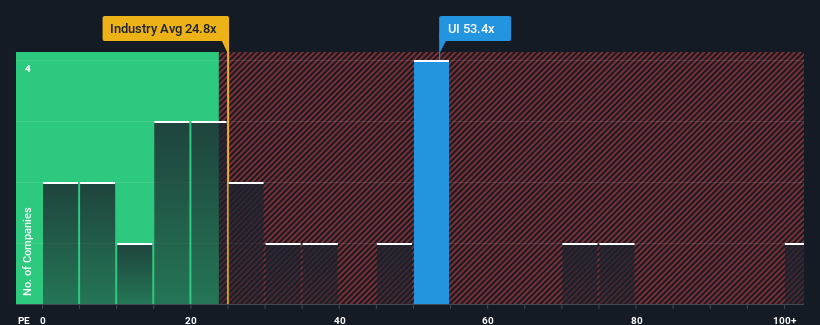- United States
- /
- Communications
- /
- NYSE:UI
Ubiquiti Inc.'s (NYSE:UI) P/E Is Still On The Mark Following 37% Share Price Bounce
Despite an already strong run, Ubiquiti Inc. (NYSE:UI) shares have been powering on, with a gain of 37% in the last thirty days. The last month tops off a massive increase of 180% in the last year.
Following the firm bounce in price, given close to half the companies in the United States have price-to-earnings ratios (or "P/E's") below 19x, you may consider Ubiquiti as a stock to avoid entirely with its 53.4x P/E ratio. Nonetheless, we'd need to dig a little deeper to determine if there is a rational basis for the highly elevated P/E.
Ubiquiti hasn't been tracking well recently as its declining earnings compare poorly to other companies, which have seen some growth on average. One possibility is that the P/E is high because investors think this poor earnings performance will turn the corner. You'd really hope so, otherwise you're paying a pretty hefty price for no particular reason.
Check out our latest analysis for Ubiquiti

What Are Growth Metrics Telling Us About The High P/E?
Ubiquiti's P/E ratio would be typical for a company that's expected to deliver very strong growth, and importantly, perform much better than the market.
If we review the last year of earnings, dishearteningly the company's profits fell to the tune of 3.0%. The last three years don't look nice either as the company has shrunk EPS by 32% in aggregate. Accordingly, shareholders would have felt downbeat about the medium-term rates of earnings growth.
Looking ahead now, EPS is anticipated to climb by 47% during the coming year according to the lone analyst following the company. With the market only predicted to deliver 15%, the company is positioned for a stronger earnings result.
With this information, we can see why Ubiquiti is trading at such a high P/E compared to the market. Apparently shareholders aren't keen to offload something that is potentially eyeing a more prosperous future.
The Key Takeaway
The strong share price surge has got Ubiquiti's P/E rushing to great heights as well. It's argued the price-to-earnings ratio is an inferior measure of value within certain industries, but it can be a powerful business sentiment indicator.
We've established that Ubiquiti maintains its high P/E on the strength of its forecast growth being higher than the wider market, as expected. Right now shareholders are comfortable with the P/E as they are quite confident future earnings aren't under threat. It's hard to see the share price falling strongly in the near future under these circumstances.
You always need to take note of risks, for example - Ubiquiti has 1 warning sign we think you should be aware of.
Of course, you might also be able to find a better stock than Ubiquiti. So you may wish to see this free collection of other companies that have reasonable P/E ratios and have grown earnings strongly.
New: AI Stock Screener & Alerts
Our new AI Stock Screener scans the market every day to uncover opportunities.
• Dividend Powerhouses (3%+ Yield)
• Undervalued Small Caps with Insider Buying
• High growth Tech and AI Companies
Or build your own from over 50 metrics.
Have feedback on this article? Concerned about the content? Get in touch with us directly. Alternatively, email editorial-team (at) simplywallst.com.
This article by Simply Wall St is general in nature. We provide commentary based on historical data and analyst forecasts only using an unbiased methodology and our articles are not intended to be financial advice. It does not constitute a recommendation to buy or sell any stock, and does not take account of your objectives, or your financial situation. We aim to bring you long-term focused analysis driven by fundamental data. Note that our analysis may not factor in the latest price-sensitive company announcements or qualitative material. Simply Wall St has no position in any stocks mentioned.
About NYSE:UI
Ubiquiti
Develops networking technology for service providers, enterprises, and consumers in North America, Europe, the Middle East, Africa, Asia Pacific, South America.
Flawless balance sheet with solid track record.
Similar Companies
Market Insights
Community Narratives



